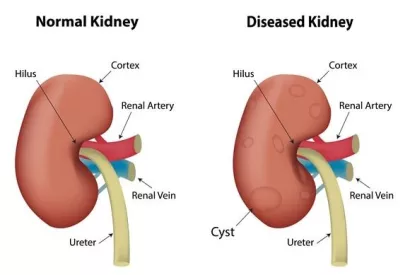The malfunction kidney caused by Medullary Cystic disease symptoms leads the kidneys to produce urine that is not concentrated enough.
Medullary Cystic Disease or Medullary Cystic Kidney Disease is an uncommon condition where small, fluid-filled sacs called cysts form in the kidneys center. These cysts defect the kidneys and cause them to cannot function properly.
In other words, urine is mostly too watery and lacks the proper amount of waste. As a result, it will end up urinating way more fluid than usual as your body tries to eliminate all the extra waste. So, when the kidneys produce excessive urine, then, other vital chemicals, sodium, and water are lost. When this condition continues to happen, Medullary Cystic Disease can lead to kidney failure.
Factors or causes of Medullary Cystic disease
Medullary Cystic disease are autosomal dominant genetic conditions. This means that you only need to get the gene from one parent to develop the disorder. If a parent has the gene, a child has a 50 percent chance of getting it and developing the condition.
Symptoms of Medullary Cystic Disease
Unfortunately, the medullary cystic disease symptoms are similar to the signs of many other diseases, making it hard to diagnosis. These indications include:
- weakness
- salt cravings
- low blood pressure
- excessive urination
- the frequency of urination increased at night

As the disease continues, kidney failure may result. The indication of kidney failure can include:
- coma
- nausea
- a headache
- easily tired
- bloody stools
- loss of weight
- vomiting blood
- frequent hiccups
- itching on the skin
- bleeding or bruising
- seizures and weakness
- muscle cramping or twitching
- loss of feeling in the feet or hands
- changes in skin color usually brown or yellow
Diagnosis for Medullary Cystic disease
If you have symptoms of Medullary Cystic disease, your doctor may order several different tests to confirm your diagnosis. Blood and urine tests will be the most important for identifying this disease.
Blood Count
A complete blood count looks at your overall numbers of red blood cells, white blood cells, and platelets. This test looks for anaemia and signs of infection.
Urine Collection
A 24-hour urine collection will confirm excessive urination, document the volume and the loss of electrolytes, and measure the creatinine clearance. The creatinine clearance will reveal whether the kidneys are functioning properly.
Uric Acid Test
A uric acid test will be done to check uric acid levels. Uric acid is a chemical created when your body breaks down certain food substances. Uric acid passes out of the body through urine. Levels of uric acid are usually high in patients that have Medullary Cystic disease.
Urinalysis
A urinalysis will be done to analyse the colour, specific gravity, and pH (acid or alkaline) levels of your urine. In addition, your urine sediment will be checked for blood, protein, and cell content. This testing will assist the doctor in confirming a diagnosis or ruling out other possible disorders.
Biopsy
In a kidney biopsy, a doctor or other health professional will remove a small piece of kidney tissue to examine it in a lab, under a microscope. This can help rule out other possible causes of your symptoms, including infections, unusual deposits, or scarring. A biopsy can also help your doctor understand the stage of the kidney disease.

How Is Medullary Cystic Kidney Disease Treated?
There is no cure for Medullary Cystic disease. Among treatment for the condition consists of interventions that need to reduce symptoms and slow the progression of the disease. In the early stages of the disease, the doctor may suggest increasing the intake of fluids. To avoid hydration, the patient may also require consuming salt supplement. When the disease persists, it may result in kidney failure.
If this happens, the patient will require undergoing dialysis. Although dialysis is a life-sustaining treatment, patients with kidney failure may also be able to undergo kidney transplants.
Unfortunately, Medullary Cystic disease leads to end-stage renal disease — in other words, eventually, kidney failure will occur. At that point, you will need to have a kidney transplant or undergo dialysis regularly to keep your body functioning properly. Talk to your doctor about your options.
Get Insurance Advice
Financial Security – It is There When Needed
Levine can help you to protect yourself and the future of your loved ones. Get immediate financial security. Don’t touch your savings. Let insurance provide it.
She can help provide financial security in times of hardship and will be able to ease the financial burden of your dependents in your absence.
Contact our AIA INSURANCE AGENT LEVINE LEE to get in touch with us and start your personal coverage, group coverage or choose your plan now. Get covered correctly. Be advised correctly. Call Levine Lee (+6012-684 0948) today to be advised on the best insurance protection personalized for you. Or send us the form below on your interest.

At Red Cover Life Planning, we emphasize our people- helping them grow, expanding their abilities, and discovering new opportunities. Join us now to be part of our team and story.








